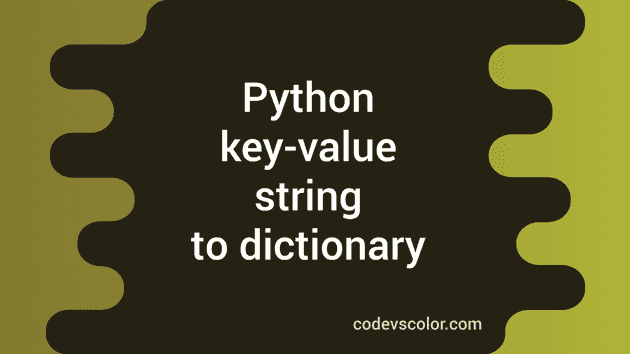Python key-value string to dictionary:
Suppose, a string with key-value pairs is given. We need to convert it to a dictionary.
For example, if the string is ‘one: 1, two: 2, three: 3’, and we need to convert it to a dictionary {‘one’: ‘1’, ‘two’: ‘2’, ‘three’: ‘3’}. We can also have strings with any other separated characters.
This post will show you how to do this in Python with example.
By using split:
We can split the string at , and other items at :. We can then use dictionary comprehension dict() to convert each pair to a dictionary. For example:
given_str = 'one: 1, two: 2, three: 3'
splitted_str = given_str.split(',')
dict = {}
for item in splitted_str:
key_value = item.split(':')
dict[key_value[0]] = key_value[1].strip()
print(dict)Here,
- We are splitting the string two times. The first time, it splits at , and puts the array in splitted_str.
- It iterates through each item of the splitted array and splits each at :.
- Then it assigns the key-value pairs in the dictionary.
If you run the above program, it will print:
{'one': '1', ' two': '2', ' three': '3'}We can also write this as like below:
given_str = 'one: 1, two: 2, three: 3'
final_dict = dict(item.split(":") for item in given_str.split(","))
final_dict = {key.strip(): value.strip()
for (key, value) in final_dict.items()}
print(final_dict)The first line is enough to create the final_dict, but we are also removing the leading and trailing spaces by using strip() in the second line.
It will print the same output.
Using map:
We can also pass a lambda to a map to create the key-value pairs. It can be passed to dictionary comprehension to get the final dictionary. Below is the complete program:
given_str = 'one: 1, two: 2, three: 3'
final_dict = dict(map(lambda item: item.split(':'), given_str.split(',')))
final_dict = {key.strip(): value.strip()
for (key, value) in final_dict.items()}
print(final_dict)It gives the same output.
You might also like:
- Python program to print Arithmetic progression series
- Python program to check if a series is Arithmetic progression or not
- How to print Geometric progression or GP in python
- Python program to check if a series is Geometric progression
- Python program to count total digits in a string in four ways
- Python program to count total repeating digits in a number

